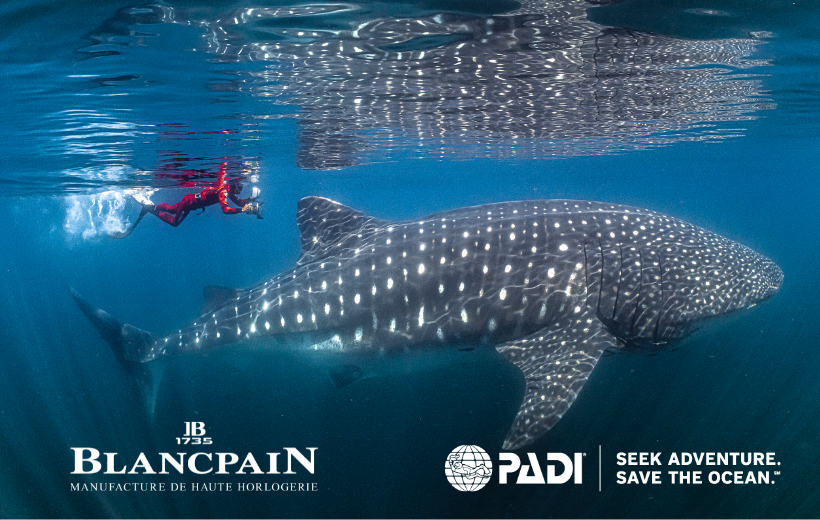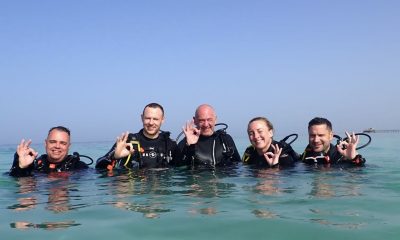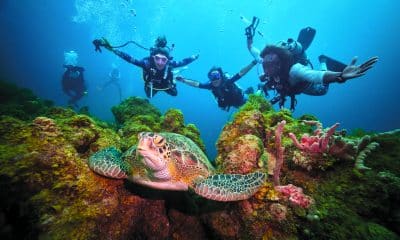Marine Life & Conservation
PADI and Blancpain announce new citizen science initiative

PADI® and Swiss prestige watchmaker, Blancpain are combining resources to work towards saving 30% of the ocean by 2030 – with the two organisations teaming up to create the Vulnerable Marine Species Program. Blancpain’s support will be key in funding the Global Shark & Ray Census, a new citizen science initiative that is slated to launch Earth Day 2024 and is designed to help protect vulnerable marine species around the globe from extinction.
PADI and Blancpain have been kindred spirits in Ocean conservation starting over two decades ago with a whale shark identification project. This latest evolution comes one year after both organisations announced an expanded commitment to partner and increase the number of marine protected areas (MPAs) around the globe. As a founding partner of PADI’s Blueprint for Ocean Action, Blancpain accelerated the creation of PADI’s MPA Program and its flagship citizen science program Adopt the Blue™. Millions of recreational divers now have the direct ability to choose to be Ocean Torchbearers and directly engage in meaningful marine conservation activities while exploring the Ocean.
“Blancpain has long been committed to real engagement in Ocean Conservation issues. Working together, will be a force multiplier in achieving our shared Ocean Conservation goals” says Dr. Drew Richardson, CEO of PADI Worldwide and Chairman of PADI AWARE Foundation. “Blancpain’s expanded support of PADI’s Vulnerable Marine Species Program forges a juggernaut combining the Blancpain Ocean Commitment with the PADI Blueprint for Ocean Action in advancing positive ocean change.”
Now, with the generous support from Blancpain, PADI and global non-profit partner PADI AWARE FoundationTM will build and deploy the largest underwater citizen science program designed to protect sharks and rays from extinction. In addition, PADI AWARE Foundation’s Mission Hub Community Grant Program will include support for both MPA and Vulnerable Marine Species Grantees internationally and at a local level. These grants support critical conservation initiatives in local communities all around the world.
PADI AWARE Foundation is among the world’s most successful shark and ray conservation organisations, with a 30-year track record of groundbreaking conservation measures for the oceanic whitetip shark, great hammerhead, giant manta ray, whale shark, and mako sharks – along with many other vulnerable species. Last year at CITES (the Convention on Trade of Endangered Species of Wild Fauna and Flora) in Panama City. PADI was invited to CITES and asked to provide specialist advice and research to all attending government representatives. This helped secure support for a critical vote to double the amount of protected shark and ray species. To date, the PADI AWARE Foundation and PADI have helped secure protection measures for over 105 species of sharks and rays.
“With a growing base of divers interested in shark conservation, the Global Shark and Ray Census enables divers to function as diving citizen scientists in order to collect high-quality data and information on vulnerable shark species. Engaged divers across the planet who choose to participate will directly help accelerate national and global protection measures where they are needed most,” continues Richardson.
If you would like to personally support the PADI AWARE Foundation and Blancpain in creating positive ocean change, donations can be made to the PADI AWARE Shark Appeal. Blancpain has generously agreed to match donations 1:1 this SHARK Week, which will go towards supporting the development of the Vulnerable Species Program.
For more, visit www.padi.com
Marine Life & Conservation
Double Bubble for Basking Sharks

 The Shark Trust is excited to announce that, for two more days only, all donations, large or small, will be doubled in the Big Give Green Match Fund!
The Shark Trust is excited to announce that, for two more days only, all donations, large or small, will be doubled in the Big Give Green Match Fund!
Donate to Basking in Nature: Sighting Giants
The Shark Trust is hoping to raise £10k which will be doubled to £20k. This will go towards Basking in Nature: Sighting Giants. And they need YOUR help to reach they’re goal.
The Shark Trust’s citizen science project is to monitor and assess basking sharks through sightings; encouraging data collection, community engagement, and promoting nature accessibility. This initiative aims to enhance health and wellbeing by fostering a deeper connection with British Sharks.
Campaign Aims
- Increase citizen science reporting of Basking Sharks and other shark sightings to help inform shark and ray conservation.
- Provide educational talks about the diverse range of sharks and rays in British waters and accessible identification guides!
- Create engaging and fun information panels on how to ID the amazing sharks and rays we have on our doorstep! These can be used on coastal paths around the Southwest. With activities and information on how you can make a difference for sharks and rays!
- Promote mental wellbeing through increasing time in nature and discovering the wonders beneath the waves!
Donate, and double your impact. Click Here
Marine Life & Conservation
Leading UK-based shark conservation charity, the Shark Trust, is delighted to announce tour operator Diverse Travel as a Corporate Patron

 Corporate Patrons provide a valuable boost to the work of The Shark Trust. The Trust team works globally to safeguard the future of sharks, and their close cousins, the skates and rays, engaging with a global network of scientists, policymakers, conservation professionals, businesses and supporters to further shark conservation.
Corporate Patrons provide a valuable boost to the work of The Shark Trust. The Trust team works globally to safeguard the future of sharks, and their close cousins, the skates and rays, engaging with a global network of scientists, policymakers, conservation professionals, businesses and supporters to further shark conservation.
Specialist tour operator Diverse Travel has operated since 2014 and is committed to offering its guests high quality, sustainable scuba diving holidays worldwide. Working together with the Shark Trust will enable both organisations to widen engagement and encourage divers and snorkellers to actively get involved in shark conservation.
“Sharks are truly at the heart of every diver and at Diverse Travel, we absolutely share that passion. There is nothing like seeing a shark in the wild – it’s a moment that stays with you forever!” says Holly Bredin, Sales & Marketing Manager, Diverse Travel.
“We’re delighted to celebrate our 10th year of business by becoming a Corporate Patron of the Shark Trust. This is an exciting partnership for Diverse and our guests. We will be donating on behalf of every person who books a holiday with us to contribute towards their vital shark conservation initiatives around the world. We will also be working together with the Trust to inspire divers, snorkellers and other travellers to take an active role – at home and abroad – in citizen science projects and other activities.”
Paul Cox, CEO of The Shark Trust, said:
“It’s an exciting partnership and we’re thrilled to be working with Diverse Travel to enable more divers and travellers to get involved with sharks and shark conservation. Sharks face considerable conservation challenges but, through collaboration and collective action, we can secure a brighter future for sharks and their ocean home. This new partnership takes us one more valuable step towards that goal.”
For more information about the Shark Trust visit their website here.
For more about Diverse Travel click here.
-

 News3 months ago
News3 months agoHone your underwater photography skills with Alphamarine Photography at Red Sea Diving Safari in March
-

 News3 months ago
News3 months agoCapturing Critters in Lembeh Underwater Photography Workshop 2024: Event Roundup
-

 Marine Life & Conservation Blogs3 months ago
Marine Life & Conservation Blogs3 months agoCreature Feature: Swell Sharks
-

 Blogs2 months ago
Blogs2 months agoMurex Resorts: Passport to Paradise!
-

 Blogs2 months ago
Blogs2 months agoDiver Discovering Whale Skeletons Beneath Ice Judged World’s Best Underwater Photograph
-

 Gear Reviews2 weeks ago
Gear Reviews2 weeks agoGEAR REVIEW – Revolutionising Diving Comfort: The Sharkskin T2 Chillproof Suit
-

 Marine Life & Conservation2 months ago
Marine Life & Conservation2 months agoSave the Manatee Club launches brand new webcams at Silver Springs State Park, Florida
-

 Gear Reviews3 months ago
Gear Reviews3 months agoGear Review: Oceanic+ Dive Housing for iPhone


















